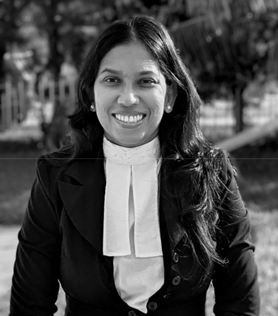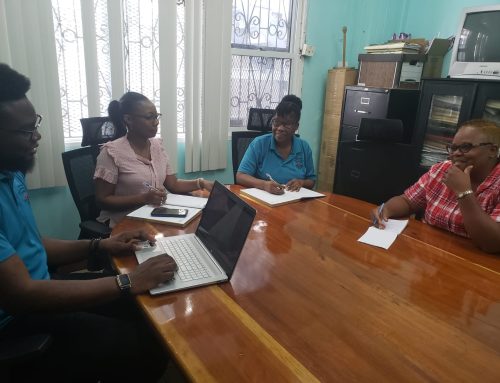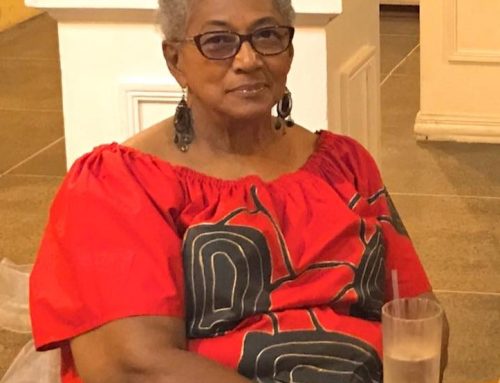 International Day of Persons with Disabilities 2021
International Day of Persons with Disabilities 2021
Speech By:
Mrs. Vidushi Persaud-McKinnon
Attorney-at-Law
&
Chair (Ag) of the National Commission on Disability
“Leave no one behind – Inclusion of Persons with Disabilities in Guyana”
Today, in observance of International Day of Persons with Disabilities, let us spend a few moments reflecting on the theme for this year which is: “Leadership and Participation of Persons with Disabilities toward an Inclusive, Accessible and Sustainable post-COVID”, which focuses on the empowerment of Persons with Disabilities for inclusive, equitable and sustainable development in keeping with the 2030 Agenda for Sustainable Development. “Leave no one behind” is a central principle of the 2030 Agenda for Sustainable Development and its Sustainable Development Goals. It requires the inclusion of persons with disabilities.
While the introduction of the 2030 Agenda represents a step forward for all people with disabilities, the development of the new framework also signifies an important step forward in recognition of mental health as a development issue. The preceding Millennium Development Goals contained no reference to mental health; however, the Sustainable Development Goals specifically highlight the promotion of mental health as intrinsically tied to broader health and well-being outcomes.
There are a number of unreported cases of persons with disabilities suffering untold hardships at home and in communities in this time of COVID-19. Persons living with disability who have suspected or confirmed COVID-19 may need support with their mental health.
Ongoing harms caused by the pandemic have been especially evident for persons with disabilities. Disruptions in education, employment, health care, and social services have been amplified. Parents took on and are still taking on full-time care-giving roles, while also stepping into new roles as special educators, speech therapists, behavior therapists, and more. This has been exhausting, frustrating, and often just not possible for many families.
Leadership and Participation of Persons with Disabilities toward an Inclusive, Accessible and Sustainable post-COVID will have to include a number of steps so as to ensure that the unique needs of persons with disabilities are considered such as:
- Ensuring that all health care facilities that provide testing and services for COVID-19, including quarantine and isolation services are accessible and inclusive.
- Use all available channels to communicate with people with disability and make all public health information accessible to all forms of disabilities.
The rapid pace of new information presents access barriers when these materials do not follow accessibility standards for those who require alternate formats by screen reader, captioning, or in Sign Language.
An interesting development in Zimbabwe is that three associations of persons living with disabilities took the Zimbabwe Broadcasting Corporation to court, demanding that information on COVID-19 be provided in accessible formats to people living with visual and hearing impairments.
- Engage persons with disability and their representatives in planning for the COVID-19 response, to address the needs of all persons, including in peripheral and remote areas.
- Ensure that financial compensation schemes are inclusive of people with disability and provide flexible work arrangements for them, their families and caregivers to cope with economic implications of the COVID-19 situation such as quarantine, reduced hours, rotation, any future lock-down and physical isolation.
- Ensure continuity of services and support where the number of available caregivers may be reduced, including fast-track training opportunities for new workforce.
- Public advice campaigns and information should be made available in sign language and accessible means, modes and formats, including accessible digital technology, captioning, relay services, text messages, easy-to-read and plain language.
- Other examples may be distribution of food, cleaning supplies and hampers etc can be taken to residences of persons with disabilities instead of expecting them to come to central collection points.
Governments and civil society organisations must work closely with associations of persons living with disabilities to coordinate care, provide support, and ensure their rights are protected.
Such associations know their members, the types of disabilities they live with, their particular needs, and where they live. These associations also have established ways of reaching out to their members and protecting their rights.
COVID-19 is upending the lives of every Guyanese. For persons with disabilities, the impact can be severe, increasing barriers to accessing critical public health information, healthcare and support services. The Covid-19 brings new challenges as well such as difficulty engaging in preventative measures such as physical distancing and frequent hand-washing. Although many persons with disabilities are healthy, some have secondary conditions that increase their risk for contracting COVID-19. All of these factors can contribute to stress and anxiety.
There are a number of things taken for granted and the extra steps that have to be taken by persons with disabilities which I wish to share with you on today’s International Day:
- If you are physically challenged, you will have to wash your mobility equipment down, such as push rims on wheelchairs, walkers, crutches. If for example, a person has limited hand function, he/she will have to avoid using the mouth to take their gloves off and have to find a different mechanism to remove them, such as using an assistive device.
- If you are visually impaired or have low vision, you may touch more surfaces during navigation than others.
- If you depend on multiple caregivers to help with daily tasks, a person with a disability will have to try to limit the number to help practice physical distancing.
- Think about communications needs. If you are deaf or hard of hearing, it may be challenging to know what doctors and nurses are communicating through their personal protective equipment such as masks. They may also talk to you from behind a window or curtain, making it harder for you to understand them. Persons can seek to ask health staff to convey information in writing and plan alternative modes of communication. For example, bring a paper and pen or a small whiteboard and marker or a digital notebook
- If you rely on personal care attendants to assist with activities of daily living, easy access to caregivers may be more challenging during this ongoing pandemic.
- If you are blind or need assistance with essential errands, factor in limited transportation opportunities at this time. Conveniences that you used before the pandemic, such as home grocery delivery, are sometimes limited due to increased demands, scarce supplies, or backorders.
The pandemic has disrupted the economy and employment, contributing to stress and worry over job security and finances. Managing a disability can add to those concerns.
In this regard, on behalf of the National Commission on Disability, I wish to publicly commend the President of Guyana, Dr. Ali, for the sterling declarations made recently with respect to the grant of $25,000 to be distributed to persons living with disabilities.
We commend the Government of Guyana for taking such specific steps to assist persons with disabilities who have undeniably disproportionately suffered during this ongoing pandemic which appears to have no end in the near future as the Omicron Variant lurks ominously. Such persons have been devastated medically, through their disability-related vulnerability and dangerous medical responses to it. They have been hindered practically, because of the extra difficulties they face in protecting themselves. And like everyone else, they have been affected socially by a year of isolation and stress.
All service providers must ensure that persons with disability are not left behind during the COVID-19 outbreak and that they are treated with respect, dignity and without discrimination.
If you are a person with a disability, or you live and work with persons with disabilities, or if you assist, care for, or serve persons with disabilities and/or chronic health conditions, please take the risks to them seriously and be extra careful with your own precautions so you can remain healthy and able to help. Viruses do not discriminate and neither should we.
Stay well and keep safe my Fellow Guyanese. Protect yourself and others: get vaccinated.


